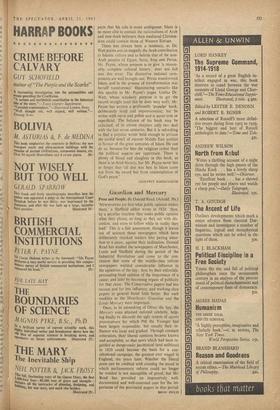,Guardian and Mercury
Press and People. By Donald Read. (Arnold, 30s.) 'NEWSPAPERS are first what public opinion makes them,' a Sheffield editor wrote in 1820; 'then, by a peculiar reaction they make public opinion what they please, so long as they act with dis- cretion, and seem to follow while in reality they lead.' This is a fair assessment, though it leaves out of account those newspapers which have deliberately shocked readers into paying atten- tion to a cause, against their inclination. Donald Read has studied the newspapers of Manchester, Leeds and Sheffield during the period of the Industrial Revolution and come to the con- clusion that some of the middle-class reform newspapers wielded considerable influence in the agitations of the day : first, by their editorials, persuading local opinion of the importance of a cause; and later by becoming organs of publicity for that cause. The Conservative papers had less success and far less influence, and working-class papers in general fared little better. But such weeklies as the Manchester Guardian and the Leeds Mercury were important.
Once, in its unmasking of Oliver the Spy, the Mercury even attained national celebrity, help- ing finally to discredit the ugly system of agents provocateurs for which Pitt the Younger had been largely responsible; but usually their in- fluence was local and gradual. Through constant reiteration, their liberal opinions became known and acceptable, so that news which had been re- garded as dangerously jacobinical (and seditious) in 1820 could become the basis for a con- stitutional campaign, the greatest ever waged in England, ten years later. Whether the liberal press can be credited with creating the mood in which parliamentary reform could no longer be resisted is not susceptible of proof, but Mr. Read has provided an impressively well- documented and well-reasoned case for the im- portance of the provincial papers in that period.
BRIAN INGLIS














































 Previous page
Previous page